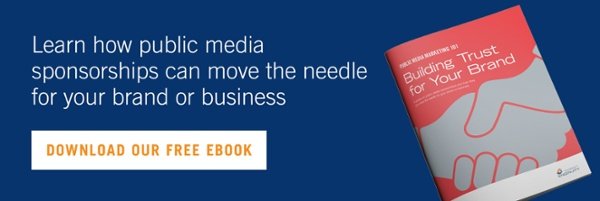Public Media Sponsorship in the Time of COVID‑19
We are — every person on this planet — living with a stark, new reality as the coronavirus and the disease it causes, COVID-19, travels from nation to nation, to almost every community we know. Many people are becoming ill. Others are losing their jobs as companies cut back and government at every level struggles to respond.
If you’re a public media salesperson, you are probably seeing clients cancel schedules or hesitate from committing to new ones as a result of economic uncertainty. You might be wondering, “Is it even ‘okay’ to present my station’s marketing solutions during this crisis?”
I think so. In fact, as many professionals must now work from home, making a “sales” call is an opportunity for connection. It will be appreciated, and, when done well, everybody wins — especially given the affinity public media and quality podcast listeners have for brands that support the content they rely on daily.
With 69% of NPR® listeners preferring to buy products or services from NPR sponsors¹, having corporate sponsorship conversations with marketers today helps businesses.
THREE REASONS BRANDS SHOULD MESSAGE
“In times of crisis,” writes Twitter executives Alex Josephson and Eimear Lambe on the social network’s blog, “people look to leaders and institutions for guidance, reassurance and information. Increasingly, they also look to businesses.”²
Reason 1: Leadership
A great example of crisis messaging comes from Olive Garden. The national restaurant chain announced on March 10, 2020 that all of its hourly employees will receive permanent, paid sick leave benefits to help them through the coronavirus health crisis.
Responding to Olive Garden’s announcement, Rachel Mercer, of business consulting firm R/GA, tweeted, “…remember that how you behave is more meaningful and valuable than what you say.”
She meant how brands behave, and she’s right. This is where public media salespeople can shine. Brands need to get messages out about how they’re behaving well.
Reason 2: Share their response to the crisis
At WAMU 88.5, D.C.’s NPR news station, a local account executive reached out to nationally-known bookstore Politics and Prose. By illustrating that WAMU listenership was up during the coronavirus crisis — because consumers trust public radio — she encouraged the bookstore to share on-air how it is helping their customers and employees. Here is the message copy she crafted for them:
“Support for WAMU comes from Politics and Prose. During this unprecedented time, Politics and Prose is taking steps to keep their customers and staff safe, including delivery, curbside pickup and virtual events. Politics-Prose.com.”
Reason 3: Brand-building
Mark Ritson writes in Marketing Week that brands may be facing up to a 50% cut in marketing budgets in response to the new global health crisis. While brands may feel pressure to engage in performance marketing and promotional tactics in the short term, according to Ritson, “The smarter play is to actually focus [a budget] on the longer-term brand-building mission.”³
Public media builds brands. Think of the FCC guidelines about what public media messaging includes. Call-to-action and lead generation campaigns aren’t allowed so they’re all about branding. At WAMU, I’ve built proposals using recently aired copy many times. Most messaging ends with a tag to visit a brand’s website address as in “More at Google.com.” However, the carmaker Honda simply shared a message about its research and development, closing with: “Honda: We’re here, helping you stay on the move.” Ritson, again, has a great way of putting it: “The coronavirus crisis will test us all, but marketers need to think long-term and keep building their brands.”³
PUBLIC MEDIA’S UNIQUE VALUE
For account executives in public media, what we offer remains valuable and strong. Public media audiences are educated, affluent, community-minded, culturally active and influential – all characteristics most marketers seek in the targets of their campaigns.
So long as a brand is “thoughtful with copy and tone,” writes Twitter’s Josephson and Lambe, it can “contribute” to the conversation happening around COVID-19.²
Matching up a client’s initiative with our listening audience is an effective way to move them toward yes in these uncertain times.
— Michael Jortner, Marketing Communications, Corporate Sponsorship for WAMU
Sources:
1. Lightspeed Research, State of Sponsorship Survey, March 2019
2. “Brand communications in time of crisis,” by Alex Josephson and Eimear Lambe, Twitter blog, March 11 2020
3. “Marketing in the time of Covid-19,” by Mark Ritson, Marketing Week, March 17 2020
Whether you’re interested in sponsoring one of our public media stations or learning more about turnkey sponsorship representation for your station, we can help. Complete the form, and we’ll be in touch soon.
Subscribe
Every week we share insights, industry news or best practices on public media sponsorship. Receive a weekly digest of our latest blog posts so you’re always in the know.
